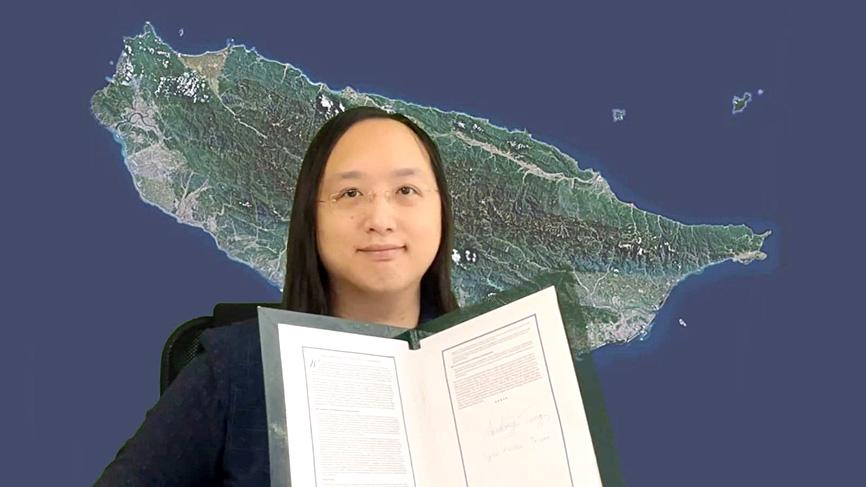Taiwan on Thursday joined dozens of countries in signing a declaration led by the US to promote a free and open Internet to counter “rising digital authoritarianism.”
Minister Without Portfolio Audrey Tang (唐鳳) represented the government at a virtual ceremony hosted by the White House and signed the Declaration for the Future of the Internet.
Other signatories included Australia, Canada, Japan, the UK and the European Commission.

Photo: screenshot from Facebook
Tang yesterday wrote on Facebook that it remained an urgent task for democratic nations to build an Internet environment where economic and social development is encouraged, and democratic values and individual rights are protected.
Taiwan has much to contribute to the task taken on by the declaration’s signatories, Tang added.
The Ministry of Foreign Affairs said that the nation’s participation in the initiative was the latest example of the close partnership between Taiwan and the US, and of US support for Taiwan’s engagement in international affairs.
It also said in a statement that Taiwan would continue working with like-minded countries to contribute to efforts to tackle global challenges.
Sixty countries have endorsed the declaration, which aims to “support a future for the Internet that is open, free, global, interoperable, reliable and secure, and affirm their commitment to protecting and respecting human rights online and across the digital world,” a White House statement said.
The US and its partners through the initiative would work to tackle what they described as “rising digital authoritarianism,” the statement said, adding that some countries had acted to repress freedom of expression, censor independent news sites, interfere with elections, promote disinformation and deny their citizens other human rights.
Signatories are committed to protecting human rights and the fundamental freedoms of all people while strengthening a multistakeholder approach to governance that keeps the Internet available for the benefit of all, the statement said.
Countries that backed the declaration agreed to promote a global Internet that advances the free flow of information and trust in the global digital ecosystem, including through protection of privacy, the statement said.
The signatories would also strive to advance inclusive and affordable connectivity so that all people can benefit from the digital economy, it added.
European Commission President Ursula von der Leyen said of the declaration in a separate statement that “the future of the Internet is also the future of democracy, of humankind.”
“Like-minded countries from all over the world are setting out a shared vision for the future of the Internet, to make sure that the values we hold true offline are also protected online, to make the Internet a safe place and trusted space for everyone, and to ensure that the Internet serves our individual freedom,” she added.

An essay competition jointly organized by a local writing society and a publisher affiliated with the Chinese Communist Party (CCP) might have contravened the Act Governing Relations Between the People of the Taiwan Area and the Mainland Area (臺灣地區與大陸地區人民關係條例), the Mainland Affairs Council (MAC) said on Thursday. “In this case, the partner organization is clearly an agency under the CCP’s Fujian Provincial Committee,” MAC Deputy Minister and spokesperson Liang Wen-chieh (梁文傑) said at a news briefing in Taipei. “It also involves bringing Taiwanese students to China with all-expenses-paid arrangements to attend award ceremonies and camps,” Liang said. Those two “characteristics” are typically sufficient

A magnitude 5.9 earthquake that struck about 33km off the coast of Hualien City was the "main shock" in a series of quakes in the area, with aftershocks expected over the next three days, the Central Weather Administration (CWA) said yesterday. Prior to the magnitude 5.9 quake shaking most of Taiwan at 6:53pm yesterday, six other earthquakes stronger than a magnitude of 4, starting with a magnitude 5.5 quake at 6:09pm, occurred in the area. CWA Seismological Center Director Wu Chien-fu (吳健富) confirmed that the quakes were all part of the same series and that the magnitude 5.5 temblor was

The brilliant blue waters, thick foliage and bucolic atmosphere on this seemingly idyllic archipelago deep in the Pacific Ocean belie the key role it now plays in a titanic geopolitical struggle. Palau is again on the front line as China, and the US and its allies prepare their forces in an intensifying contest for control over the Asia-Pacific region. The democratic nation of just 17,000 people hosts US-controlled airstrips and soon-to-be-completed radar installations that the US military describes as “critical” to monitoring vast swathes of water and airspace. It is also a key piece of the second island chain, a string of

The Central Weather Administration has issued a heat alert for southeastern Taiwan, warning of temperatures as high as 36°C today, while alerting some coastal areas of strong winds later in the day. Kaohsiung’s Neimen District (內門) and Pingtung County’s Neipu Township (內埔) are under an orange heat alert, which warns of temperatures as high as 36°C for three consecutive days, the CWA said, citing southwest winds. The heat would also extend to Tainan’s Nansi (楠西) and Yujing (玉井) districts, as well as Pingtung’s Gaoshu (高樹), Yanpu (鹽埔) and Majia (瑪家) townships, it said, forecasting highs of up to 36°C in those areas